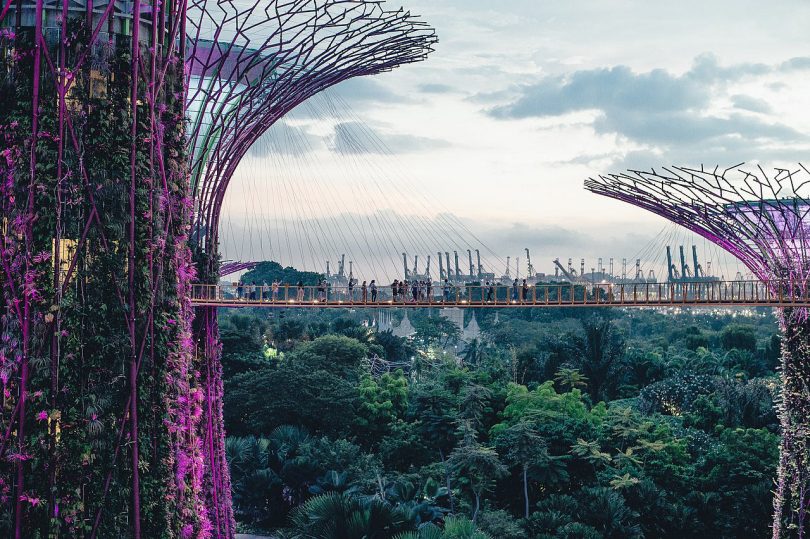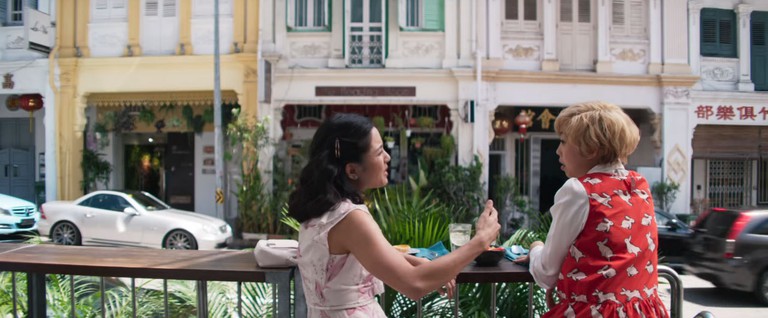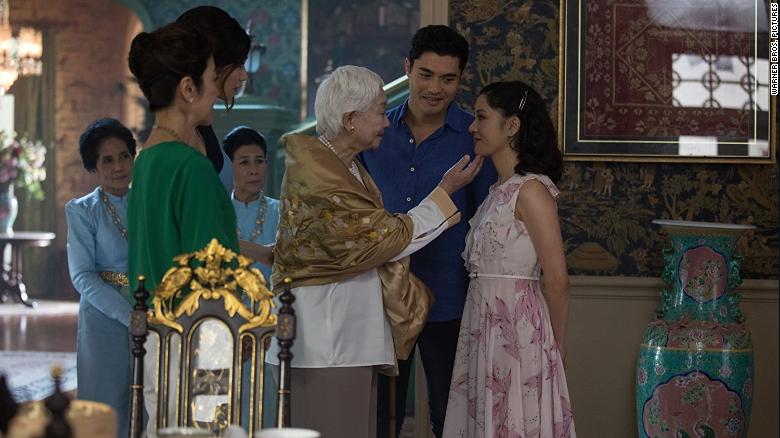Singapore’s art and culture has never been in so big a spotlight.
Crazy Rich Asians, a movie based on a book by Singaporean author Kevin Kwan, has topped the US box office two weekends in a row and is set to make history this summer. The movie takes place in Singapore and depicts a glamorous city with mansions, exotic foods and well-heeled Asians in fashionable clothes. (Coming from a Singaporean, let me tell you: Singapore is not all like that, although you can choose to only see the rich aspects of the city if you want to.)
What the movie does well, though, is shed light on our unique design culture. A short history lesson: we were a Malay village first, then a British colony, and we were occupied by the Japanese during World War II, returned to British hands at the end of the war, merged with Malaya to form Malaysia, separated from Malaysia, and finally became our own independent state in 1965.
Such a whirlwind history makes for an interesting hodgepodge of food, languages and design, some of which is depicted in the movie. Singapore’s also very modern, going from third world to first in just three decades, and our architecture spans a wide range from traditional Peranakan shophouse to modern skyscraper.
Here’a a design guide to the Crazy Rich Asians movie and an introduction to the design scene in Singapore.
Peranakan Shophouses
If you’re going to remember one sentence from the movie, it’s probably “bawk, bawk, bitch!” In the scene, Rachel (Constance Wu) and Goh Peik Lin (Awkwafina) are sitting on the patio of Humpback along Bukit Pasoh Road. This al-fresco dining area overlooks a row of Peranakan shophouses with wooden framed windows, flowery wallpaper, and storefront names in English and Mandarin. Here you can find boutique stores, trendy bars, and traditional coffee and tea houses.
In fact, directly across Humpback is the Reading Room, a lovely book cafe with some outdoor seating, that transforms into a bar at night. It’s a beautiful spot!
The shophouses are featured again in the scene (above) when Eleanor Young (Michelle Yoh) goes to meet Rachel for a mahjong face-off. This time, it is in Ann Siang Hill.
They make such a great backdrop because the Peranakan shophouses have a distinct style and sense of place, their open first-floor walkways help with ventilation and light (which is great for movie takes), and on the outside, they come painted in great hues. Shophouses similar to the ones in Crazy Rich Asians can be found in the Duxton Hill and Chinatown neighborhood, as well as in Katong, Bugis, and Emerald Hill.

Photo by Flickr user JuJulianar
Peranakan Residences and Interior Design
Patterned Rugs, Textiles, Ceramics
The Young’s mansion with its flowery, colorful style looks neither Chinese or Arab, but you can see the influence of both. The mansion (which is actually located in Malaysia) has a distinct Peranakan design that is unique to the region of Singapore, Malaysia and Indonesia. The rugs, ceramics and interior furnishings also feature Peranakan patterns. (sans the Tiger…that one has questionable origins.)
You can see the unique furnishings again in this scene, where the Young’s ah ma (a Singaporean way of saying “grandmother”) is meeting Rachel for the first time.
Ornate mansions like these often stay as private residences or are turned to restaurants, teahouses and museums. (Tip: Singapore is terribly short on land space, so more spacious mansions like the one in the film are usually found in Peranakan communities in Penang or Melacca. The latter is, incidentally, is where my Grandmother is originally from.)
Further examples of Peranakan residences:

Photo: Flickr user -Damian-

Photo: Flickr user WIL
Peranakan Fashion
Wondering what the women in the foreground are wearing? It’s a Kebaya. Both my paternal and maternal grandmothers wear the traditional Kebaya to their children’s weddings, toLunar New Year celebrations, graduation ceremonies, and other important occasions. It’s become both a formality and a tradition.
For a more modern vibe, here are some great designer places to check out:
Marina Bay Sands

Photo: Vibin JK, Wikimedia Commons
The first view you get of Singapore in Crazy Rich Asians is the aerial view of Singapore’s skyline. One prominent building among the tall skyscrapers is Marina Bay Sands. This is also the spot for the synchronized swimming cum surprise wedding party that Nick and Rachel throw at the end of the movie, where everyone comes together for a happy ending.

Photo: Flickr user Silas Khua,
This Marina Bay Sands hotel designed by Moshe Safdie also houses luxury brands in the ground floor shopping centre. Hotel residents have access to the famous infinity rooftop pool, with the best views of the Central Business District. If you want to watch from afar instead of getting wet yourself, you can go up to the top floor by visiting the cocktail bar Cé La Vi or booking a table at Spago.
(Tip: Singapore has become known for the Marina Bay Sands, but there is a really lots more to the country, and I wouldn’t recommend staying in the hotel just to get an Instagram-worthy shot of yourself at the pool.)
Raffles Hotel
Nick and Rachel stay here when Nick’s mother tells him he can’t bring Rachel home. This hotel is currently under renovation, but in any case, the suite they occupy usually costs US $7,300/night, so it’s not exactly drawing in tourists en masse.
If you want to pop in for a visit, the hotel has several cafes that serve local street fare at an affordable price. Think: local coffee, butter and kaya toasts, soft fluffy Singaporean pastries. The hotel previously housed Seah Street Deli, Ah Teng’s Bakery, Empire Cafe within the compounds, but there may be several changes when the hotel reopens.
Supertrees
This is the location of Colin Khoo’s wedding. As much as it has become a tourist attraction, Singaporeans love the Supertrees too. We don’t exactly hold weddings here, but we picnic here, go for first dates here, fall in love here, families bring their children here. There’s a musical light show, Garden Rhapsody, that takes place every evening at 7.45pm and 8.45pm. It’s also when the Supertrees are the most beautiful.

Photo credit Annie Spratt, Wikimedia Commons
I took my partner here when he visited and it was one of his favorite spots in the country!
Chijmes
I can say I’ve actually walked down the very aisle where Colin Khoo and Araminta got wed, but it wasn’t filled with water, and i wasn’t the bride. I was the flowergirl for my cousin’s wedding then. Chijmes is a popular spot for weddings given that it’s in such a great location in the middle of downtown Singapore. It was once an old school and chapel called Caldwell House, designed by British architect George Coleman, who also designed Singapore’s Old Parliament House.
Now I visit Chijmes when I want to watch soccer – the courtyard fills when fans on big soccer weekends. In the afternoon, riding around town on my O-bike, I like to stop by the courtyard for a little shade and rest. It’s a nice, quiet oasis in the middle of the city.
So there you go, a Crazy Rich Asians inspired introduction to the design and architecture of Singapore, by a Singaporean who is neither Crazy Rich nor fully Asian, but who thinks Singaporean design could use more love!
from Design MilkDesign Milk https://design-milk.com/crazy-rich-asians-guide-design-architecture-singapore/
from Home Improvment http://notelocreesnitu.tumblr.com/post/177769679274














No comments:
Post a Comment